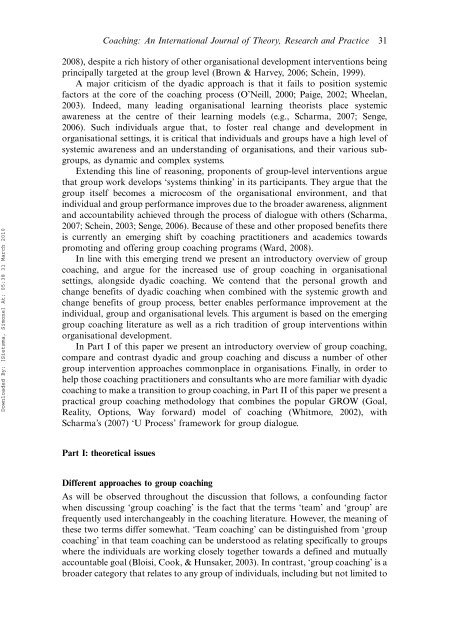Coaching: An International Journal of Theory, Research and ...
Coaching: An International Journal of Theory, Research and ...
Coaching: An International Journal of Theory, Research and ...
Create successful ePaper yourself
Turn your PDF publications into a flip-book with our unique Google optimized e-Paper software.
<strong>Coaching</strong>: <strong>An</strong> <strong>International</strong> <strong>Journal</strong> <strong>of</strong> <strong>Theory</strong>, <strong>Research</strong> <strong>and</strong> Practice 31Downloaded By: [Sietsma, Simone] At: 05:38 31 March 20102008), despite a rich history <strong>of</strong> other organisational development interventions beingprincipally targeted at the group level (Brown & Harvey, 2006; Schein, 1999).A major criticism <strong>of</strong> the dyadic approach is that it fails to position systemicfactors at the core <strong>of</strong> the coaching process (O’Neill, 2000; Paige, 2002; Wheelan,2003). Indeed, many leading organisational learning theorists place systemicawareness at the centre <strong>of</strong> their learning models (e.g., Scharma, 2007; Senge,2006). Such individuals argue that, to foster real change <strong>and</strong> development inorganisational settings, it is critical that individuals <strong>and</strong> groups have a high level <strong>of</strong>systemic awareness <strong>and</strong> an underst<strong>and</strong>ing <strong>of</strong> organisations, <strong>and</strong> their various subgroups,as dynamic <strong>and</strong> complex systems.Extending this line <strong>of</strong> reasoning, proponents <strong>of</strong> group-level interventions arguethat group work develops ‘systems thinking’ in its participants. They argue that thegroup itself becomes a microcosm <strong>of</strong> the organisational environment, <strong>and</strong> thatindividual <strong>and</strong> group performance improves due to the broader awareness, alignment<strong>and</strong> accountability achieved through the process <strong>of</strong> dialogue with others (Scharma,2007; Schein, 2003; Senge, 2006). Because <strong>of</strong> these <strong>and</strong> other proposed benefits thereis currently an emerging shift by coaching practitioners <strong>and</strong> academics towardspromoting <strong>and</strong> <strong>of</strong>fering group coaching programs (Ward, 2008).In line with this emerging trend we present an introductory overview <strong>of</strong> groupcoaching, <strong>and</strong> argue for the increased use <strong>of</strong> group coaching in organisationalsettings, alongside dyadic coaching. We contend that the personal growth <strong>and</strong>change benefits <strong>of</strong> dyadic coaching when combined with the systemic growth <strong>and</strong>change benefits <strong>of</strong> group process, better enables performance improvement at theindividual, group <strong>and</strong> organisational levels. This argument is based on the emerginggroup coaching literature as well as a rich tradition <strong>of</strong> group interventions withinorganisational development.In Part I <strong>of</strong> this paper we present an introductory overview <strong>of</strong> group coaching,compare <strong>and</strong> contrast dyadic <strong>and</strong> group coaching <strong>and</strong> discuss a number <strong>of</strong> othergroup intervention approaches commonplace in organisations. Finally, in order tohelp those coaching practitioners <strong>and</strong> consultants who are more familiar with dyadiccoaching to make a transition to group coaching, in Part II <strong>of</strong> this paper we present apractical group coaching methodology that combines the popular GROW (Goal,Reality, Options, Way forward) model <strong>of</strong> coaching (Whitmore, 2002), withScharma’s (2007) ‘U Process’ framework for group dialogue.Part I: theoretical issuesDifferent approaches to group coachingAs will be observed throughout the discussion that follows, a confounding factorwhen discussing ‘group coaching’ is the fact that the terms ‘team’ <strong>and</strong> ‘group’ arefrequently used interchangeably in the coaching literature. However, the meaning <strong>of</strong>these two terms differ somewhat. ‘Team coaching’ can be distinguished from ‘groupcoaching’ in that team coaching can be understood as relating specifically to groupswhere the individuals are working closely together towards a defined <strong>and</strong> mutuallyaccountable goal (Bloisi, Cook, & Hunsaker, 2003). In contrast, ‘group coaching’ is abroader category that relates to any group <strong>of</strong> individuals, including but not limited to
















